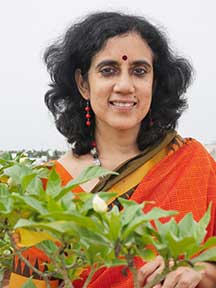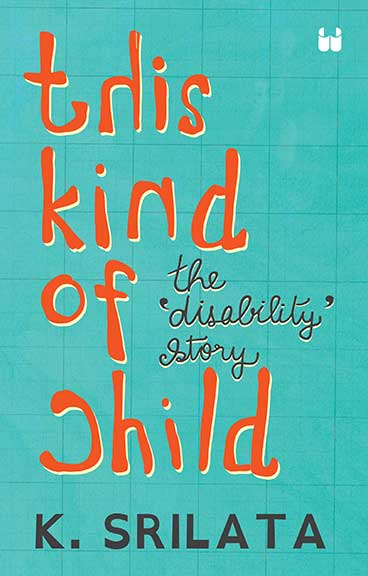Chintan Girish Modi
What is the difference between disability and impairment? Is it condescending to call someone a person with special needs if they prefer to identify themselves as deaf or blind? Who ought to take responsibility for ensuring access to rights and resources – the individuals who face barriers and experience discrimination, or all the institutions that disempower them?

If these questions interest you, read poet-novelist-translator-academic K. Srilata’s latest book titled This Kind of Child: The ‘Disability’ Story (2022) published by Westland. She is the director of the Centre for Creative Writing and Translation at Sai University in Chennai. She has poured her heart into this book and it promises to be an educative resource for parents, teachers, librarians, counsellors, principals, caregivers, and administrative staff in schools.
Drawing from the United Nations Convention on the Rights of Persons with Disabilities, the author points out that “disability results from the interaction between persons with impairments and attitudinal and environmental barriers that hinders their full and effective participation in society on an equal basis with others.” It is important to note that this book offers an expansive understanding of how disability is experienced, framed, even imposed. It does not exclude people who do not have a diagnosis from a doctor or a certificate from the state. It does not create a hierarchy among people who acquired disability at birth, through ageing, or due to an accident or illness. It acknowledges visible and invisible disabilities; physical, developmental, and psycho-social disabilities; neurodiversity and chronic illness.
This volume is based on the realization that disability is “profoundly political” and “heartbreakingly social”. This is not an armchair insight. It is deeply informed by the author’s experiences and observations because she is “the mother of a child who did not fit the school system, a child who was disabled by it.” Her initial plan was to write a book with her daughter as the protagonist but things changed somewhere down the line. In its present form, the book is a collection of multiple voices, perspectives, lived realities, and aspirations.

This Kind of Child: The ‘Disability’ Story is divided into seven sections – 1. School 2. On Our Terms 3. The Whisper of Your Head Tilting 4. Love’s Labour 5. Siblings and Children 6. Creating Roadmaps and Spaces 7. You Expert Woman, You: Interleaved Stories.
The autobiographical accounts in these sections provide a glimpse of what self-representation means to people with disabilities in a world where it is often assumed that they are deficient, helpless, and incapable of expressing how they feel and what they wish to do with their lives. This book holds up a mirror to the patronizing assumptions woven into ableism and the cruelty they lead to. It is horrifying that adults who should know better behave in such ways.
Ananya Kambhampati’s essay “Words Like Swords” is a case in point. As a child, she had to endure teachers who called her “an idiot” and declared that she must have a low intelligence quotient (IQ). Now she is a third-year undergraduate student pursuing a triple major in Western music, psychology and literature. She is also the daughter of the author of this book.
She writes, “What people do not realise about dyslexia or other learning difficulties is that they affect a person as much or even more than physical disabilities. The insults that were hurled at me for being ‘bad’ at things that others my age had mastered easily were like swords through my heart.” She is training to be a music therapist because music has been an important presence in her life. She started singing when she was four years old and it was music that helped her during the toughest of times. She wants to use music to help others.
This Kind of Child: The ‘Disability’ Story lays bare the indignities that people with disabilities have to tolerate on an everyday basis. Kristen Witucki, who is a blind author, editor, teacher, and mentor, writes about her experience of delivering a baby in the essay “When I Became A Mother”. She was worried that she would be deemed incapable of taking care of her own baby Langston, and that the nurse would not allow her to take him home.
This is a compelling example of how institutions hurt the self-esteem of people with disabilities. In addition to labour pain, she had to go through the agony of being considered incompetent as a mother. She writes, “My relatives and friends helpfully surrounded us, cocooned us, so that my advocacy efforts were minimal as I recovered. And eventually, they did release Langston, thinking, perhaps, that we were his parents only on paper, that we were not his actual caregivers. Caregivers, after all, were not supposed to be normal.”
In addition to autobiographical accounts, the book contains narratives that put the spotlight on parents, educators, and caregivers of people with disabilities. “This One Purpose” is a transcript of the author’s conversation with Chetna, who is currently pursuing her masters in speech and language pathology at a medical college. Chetna says, “The main reason I chose this field to specialize in is my brother, Tarak.” Her brother is a young man with DAMP syndrome. DAMP stands for Deficits in Attention, Motor Control and Perception.
Chetna feels responsible for her brother and hates any show of sympathy from people towards Tarak but there are days when she feels utterly frustrated. Her parents want her to get married. She says, “Until recently, I felt that I should only marry someone who will help and support Tarak. But my mother (with whom I fight a lot) explained to me that while it would be great if I found such a person, I ought not keep this in mind as a pre-condition.” By sharing her conversation with Chetna, the author presents one instance of the dilemmas that caregivers have to navigate. At the same time, the author does not put Chetna on a pedestal.
The book also features the author’s interview with Amaresh Gopalakrishnan who identifies himself as a CODA – a Child of Deaf Adults. He has more than 20 years of experience in special education, sign language interpretation, and sign language training and research. His story clarifies that caregivers may have vastly different experiences from each other not only because of their individual personalities but also due to the kind of care they are expected to provide, the level of responsibility they have to bear, and the quality of support they have.
He says, “I have been brought up in the deaf world right from birth. My parents made sure that I was not taken away by my hearing (non-deaf) grandparents or relatives, as was usually the case with other deaf parents.” Now he wants to spread the awareness that sign language is “a language in its own right” and it has all the elements of a spoken language including grammar. His father is the founder-member of the Madras Association for the Deaf.
The last section is made up of short stories written by the author of this book. They revolve around a child with dyslexia and her mother. By making room for fiction alongside the non-fiction narratives, the author validates the role of storytelling in the lives of those who find themselves marginalized and excluded. They refuse to live as victims; instead, they use their imagination and creativity to speak their truth, to dream of another world on their own terms.
The author notes, “The narrative of overcoming is, of course, a powerful one, and not to be discounted. However, this should not be the only narrative we pay heed to…What of the ‘non-successes’? What of their lives? What are the cracks through which they have fallen? How have they been failed? What value do their lives hold inherently? What of the lives of those who live with disabling pain that prevents them from leading a full life?”
This book has pushed me to confront my own tendency to gravitate towards inspirational stories and look for heroes. In the bargain, I end up paying less attention to those who do not have such laurels to boast of. This tendency feeds into ableism and communicates that people with disabilities must do something extraordinary and dazzle me with their brilliance to earn my respect. This is not how things should be.
This Kind of Child: The ‘Disability’ Story
Author: K. Srilata
Publisher: Westland
Year of publication: 2022
Number of pages: 336
Price: Rs. 599
The author is a writer, journalist and educator based in Mumbai who can be reached at chintan.writing@gmail.com or @chintanwriting on Twitter.
